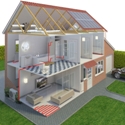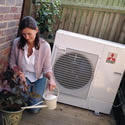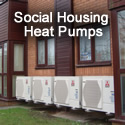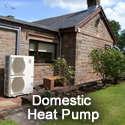Air Source Heat Pumps

Many have heard of ground source heat pumps and the high efficiency levels they can offer but few have realised that air source heat pumps can also offer significantly higher levels of efficiency when compared to traditional methods of heating our homes.
Air source heat pumps are much easier to install than ground source so they are more suitable for a wide variety of properties from flats to detached houses.
How they work

The technology inside an air source heat pump is similar to any domestic refrigerator, which uses a vapour compression cycle. The main components in the air source heat pump are the compressor, the expansion valve and two heat exchangers (an evaporator and a condenser). The technology inside the air source heat pump is similar to any domestic refrigerator, which uses a vapour compression cycle. The main components in the air source heat pump are the compressor, the expansion valve and two heat exchangers (an evaporator and a condenser). Refrigerant in the evaporator is colder than the heat source. This causes the heat to move from the heat source (in this case the outside air) to the refrigerant, which then evaporates. This vapour moves to the compressor and reaches a higher temperature and pressure. The hot vapour now enters the condenser and gives off heat as it condenses. The refrigerant then moves to the expansion valve; drops in temperature and pressure; and then returns to the evaporator.
In Operation

Ecodan air source heat pumps are ideal for use in a variety of house sizes or styles and its carefully developed control system is designed to work perfectly to provide hot water to either traditional radiators or under floor heating systems. Traditionally heat pumps have been seen as only suitable for under floor heating, however with the advanced control system of Ecodan and its ability to provide optimum variable flow temperature control, radiators can now be easily provided with the hot water they need and prove to be a very efficient option. Capacity control in radiator systems, with a fixed flow temperature is controlled by Thermostatic Radiator Valves (TRV). These operate by turning the radiators on and off to maintain the desired comfort level. For example at 2°C, with 45°C flow temperature, the radiators will be on 50% of the time and off for the other 50% of the time. The Ecodan will vary the flow temperature automatically, based on the ambient temperature to keep the house warm. Operating at these lower flow temperatures significantly improve efficiency.
Reduced energy consumption
Energy savings of over 30% are achieved by using a heat pump with a variable flow temperature as opposed to a fixed flow temperature. When installing a heat pump with a fixed flow temperature of 45ºC, annual running costs for a three bedroom house are comparable to a traditional gas boiler. If variable flow temperature with radiators are used, the running cost savings are over 20% and even greater for under floor heating systems.
Improved level of comfort

In using lower flow temperatures a more consistent heat output is achieved, Ecodan therefore gives a greater level of comfort, lower CO2 emissions and reduced running costs when heating the home. This is an alternative to high temperature radiators that give on-off bursts of heat in a bid to maintain the desired room temperature. Homes with suitably sized radiators can now enjoy a constant, controlled living environment, whilst benefiting from reduced running costs and lessening the impact on our environment.
Benefits
The Mitsubishi Electric Ecodan is designed to meet the demands of today's domestic hot water and heating requirements. Simple to install, cost effective for the end-user and with outstanding energy efficiency it is ideal for designers, installers and users.
- 30 - 50% reduction in CO2 emissions
- Helps to achieve Level 3 of the Code for Sustainable Homes
- Easy to install - self contained unit only requiring water and electric connections
- No gas supply, flues or ventilation required
- No need for groundwork or external pumps
- Single phase power supply with a low starting current
- 3 phase option available (14kW)
- Low running costs
- Low maintenance
- Even higher running cost savings and CO2 reductions with under floor heating systems
- Designed for domestic use
- Low noise - market leading 45dBA at 1 metre (5kW model)
- Reduced VAT to 5% for domestic applications
What makes it Unique

At the heart of Ecodan is a modern, inverter-driven heat pump compressor which converts free energy from the air and upgrades it to higher temperatures suitable for heating. The inverter control regulates the system so that heat output modulates to match the exact capacity required, meaning the boiler will only consume the exact energy needed at any given time and thus increase efficiency further.
Like all new technologies, air source heat pumps are an investment in the future. Developers, housebuilders and homeowners want to be assured that the technology they purchase today will be relevant and useful for many years to come. Mitsubishi Electric's Ecodan air source heat pump has been designed with the future very much in mind. More and more legislation is forcing housebuilders and homeowners to consider energy use in their properties. Part L of the Building Regulations sets targets for carbon emissions from homes and these targets are set to rise over the next five to ten years. Ecodan air source heat pumps are at the cutting edge of low-energy performance and will enable homes to meet these targets long after they are built. To meet our 2020 15% renewable energy target, the Government needs to develop new ways of generating renewable energy in all sectors, including heat. Heat generated from renewable sources accounts for only 0.6% of total heat demand - this may need to rise to 14% to hit our binding EU targets. Common examples of renewable heat technologies include: air and ground source heat pumps, biomass fuelled stoves and boilers, solar-thermal water heaters and combined heat and power (CHP) plants which are fuelled from renewable sources.
For Homeowners
You can only buy Ecodan through an Accredited Ecodan Installer (AEI). This helps to ensure that your system is optimised to suit your individual property and consistently delivers the highest standards of performance. AEI's are independent contractors and plumbers who have demonstrated that they are appropriately qualified, have attended the Mitsubishi Electric Ecodan training days and have met the qualifying criteria. Whether you live in a small flat, or a large detached house, Ecodan can help to reduce running costs, lower CO2 emissions (*) and offers reliable, sustainable heating and hot water all year round for the overwhelming majority of homes. The reduction in energy bills compared to gas, mean that the system can pay for itself within 2 – 3 years. In areas off the gas network, Ecodan can offer significant reductions in installation and running costs over oil. Maintenance on an Ecodan system is easier than gas as well, and with a professionally maintained Ecodan heat pump unit offering an average lifespan of 15 – 20 years, you'll save on annual maintenance costs too. Ecodan offers hope for hard-pressed households everywhere, with a system to suit almost any property from the 1970s (**), whether this is a small flat or a large detached house. Older properties that have been thermally upgraded can also benefit from this low carbon alternative to traditional domestic hot water systems. To work at maximum efficiency, a home needs to have thermal insulation levels equivalent to the 2000 Building Regulations.








